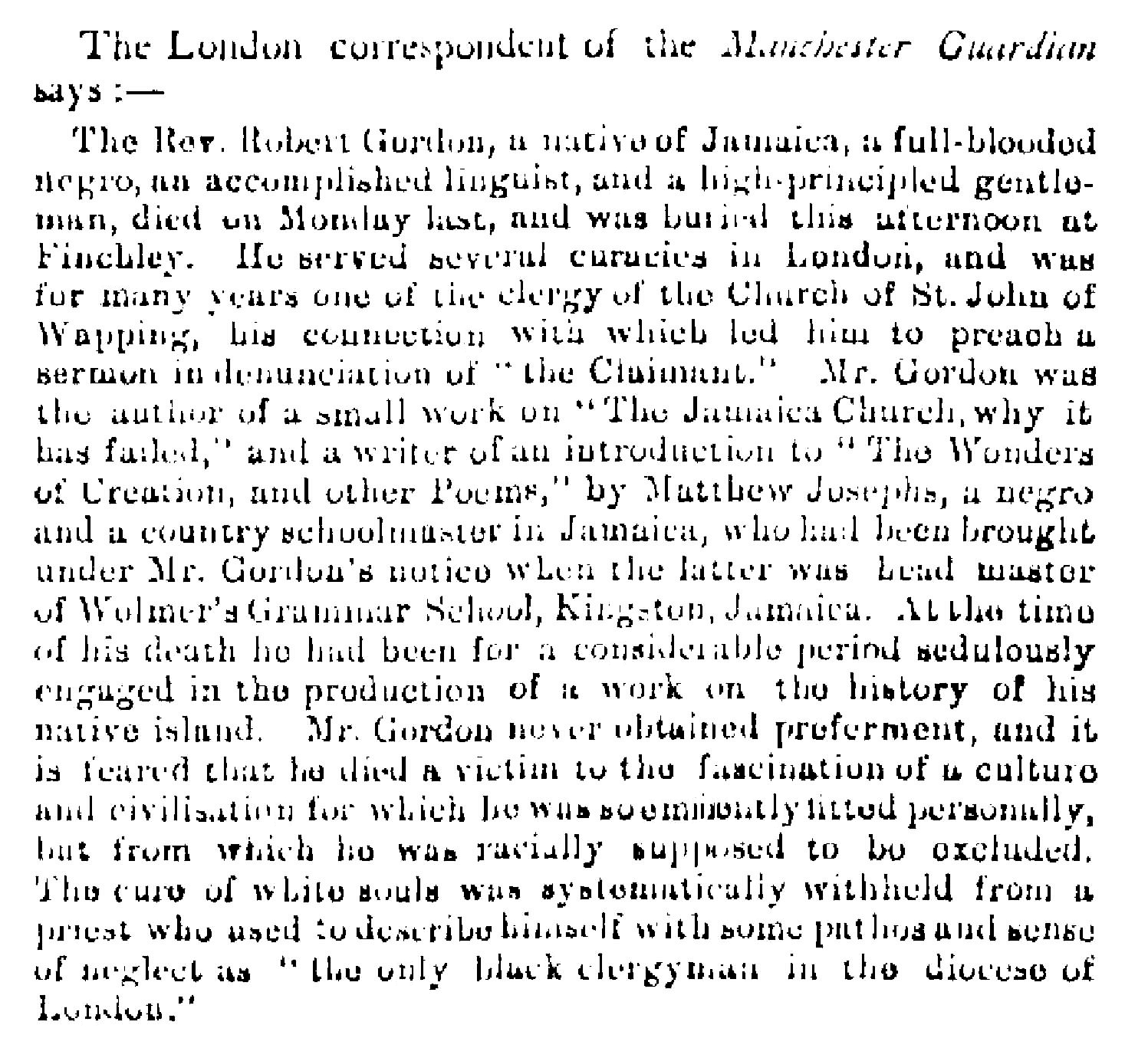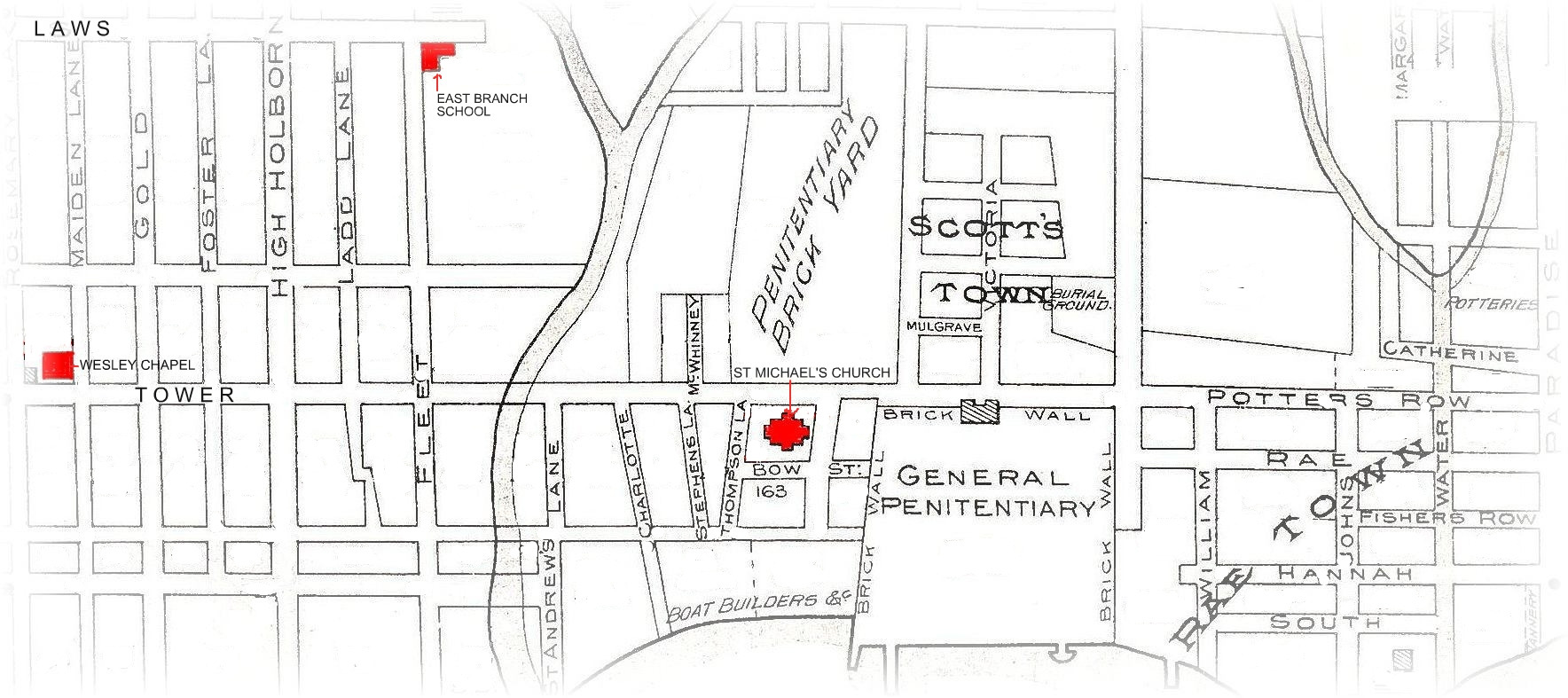Start | R Gordon | T Banbury | R O Taylor | C L Barnes | C C Douce | A Cole

London, 1885
In a letter written in January 1868, Robert Gordon gave a brief account of his background and upbringing:
I am a native of Jamaica, and of pure African blood. My parents were nativesof the same place - my mother was a well-educated, pious, amiable woman, who,although dead for nearly a quarter of a century, yet the grateful remembranceof her Christian character cannot but be specially endearing to me - She was aMethodist, and so was my father - They both did everything in their power tomake me follow the denomination to which they were attached - But finding thatmy religious sympathies were with the Church of England, to which I wasinstinctively inclined, they eventually permitted me to follow my own path.
Robert Gordon was born in 1836, presumably in Kingston. His parents, as good Methodists, were probably members of either Coke Chapel on East Parade or even more likely Wesley Chapel on Tower Street.

Robert Gordon also wrote of his early contacts with the Church of England.
There is a Church in Kingston, St Michael's, into which I used to stroll every evening when returning from school, whilst it was being built, at the consecration of which, though a boy of only about 10 years, I vowed to devote myself to the ministry of the Church of England, and in which, in after years, I frequently preached.
Robert Gordon did not identify the school he attended, but since he later taught at East Branch Church of England School, it is possible he had been a pupil there. His walk home took him past St Michael's Church, so it is possible that the family lived in Rae Town, where Black Kingstonians had bought house plots in the early 19th century.
In the Church of England in the 1850s:
Bishop's Book No 4 page 169 (Jamaica Archives)
Robert Gordon: Licensed as Catechist and Lay Reader,Highgate District, [nr Sligoville] St Catherine; April 4 1853
I, therefore, became a Catechist at the age of 17, and determined to educate myself for the position. (letter, Jaanuary, 1868) In the same 1868 letter Robert Gordon gave his account of his unsuccesful attempts to enter the priesthood of the Church of England between 1853 and 1858: Notes: 2. There is no indication of the education which would have been necessary to prepare him to become an ordinand; 3. By leaving Jamaica in 1858 he seems to have indicated a level of impatience which other young men in his position eschewed; for instance, Robert Love in the Bahamas (born 1835 or 1839), a contemporary of Gordon, did not give up his hopes there until the late 1860s.
I had to undergo difficulties of a most extraordinary character, yet I
1. If Robert Gordon was 17 in 1853, as suggested by the Bishop's Book entry, he would not have been 23 until 1859;
Bishop Courtenay gave his account of the situation in relation to Robert Gordon
in 1853-8 in a circular to the clergy in 1861 after Gordon's return to the island:

KINGSTON, APRIL 22, 1861
.... The case of Mr. Gordon has often received my most serious consideration. Since I entered this Diocese in 1853, it
has been my desire and endeavor, as Examining Chaplain, as Lecturer in Theology, and as Bishop, at once to raise
the standard of qualifications in Holy Orders, and to encourage youthful candidates for the Ministry wheresoever
they could be found if apparently pious and sincere. Against Mr. Gordon I had no personal prejudice [whatever?]. I
was very far from insensible of the advantages I should acquire, by proving myself superior to all prejudices and by
assisting merit in its efforts to rise, and, in fact, I have, in more instances than one, rather gone beyond others than to
be behind them in the measure of encouragement I was disposed to give Mr. Gordon. But had Mr. Gordon conducted
himself wisely, he might, without any assistance from me, have been now, for many years, engaged in the work of the
Ministry. In 1853, if not sooner, he applied for Ordination to the Bishop of Jamaica. For this he was utterly in
competent, but the Bishop offered him a Missionary Studentship in Codrington College, Barbados, where he might
have qualified himself for most important services under the West Indian Church Association for the Propagation of
the Gospel in West Africa. But this systematic preparation , and this arduous labor, - in which the present Principal of
Codrington College , the truly devoted Christian Mr. Rawle, was, with difficulty, restrained from sacrificing himself,
was, by Mr. Robert Gordon, disdainfully rejected. He, nevertheless, reiterated his applications for admission to the
Ministry; and was not altogether discouraged by me, though I had grave doubts concerning him; and though he had
forfeited all claim to special indulgence, by his refusal to undergo a regular training. Such encouragement as he did
obtain from me proved unfortunate, since, under the apprehension caused by a groundless report that I was about
summarily to ordain him, the inhabitants of the district of Highgate, St Catherine, where he had long been known,
and had acted as a Catechist, addressed to me, - in 1857 – a very energetic protest, based principally on certain
immoralities of his, which had caused scandal in the district. Another report to the same effect, being raised, as I
believe, designedly, during my first visitation of the Bahamas, was made the ground of what I must designate a
violent agitation and an excitement so widely prevalent, fostered too by an influential journal, that I found it
necessary to contradict the report [ illegible]. Bearing these occurrences in mind, I shall not attempt to conceal my
surprise that the Bishop who was made the object of general indignation in consequence of the false report that he
intended to Ordain Mr. Gordon, should now be asked to give effect to his Ordination, by the Bishop of a remote
Diocese, scarcely a year afterwards. Shortly after this strong exhibition of opinion Mr. Gordon proceeded to England,
and obtained an appointment under the Colonial Church and School Society at “London” in Western Canada, a place
of concourse for refugees from Slavery in the United States. After, I believe, about [illegible] months, he was admitted
to Deacon's Orders, and a year afterwards to Priest's Orders, by the Bishop of Huron; remaining still in charge of the
same mission.
I am reviewing the material I have on Robert Gordon, and looking to see what more material may exist. The situation of Robert Gordon in relation to the Church of England in Jamaica has been considered chiefly on the basis of race and colour, but it seems clear that there was a variety of other factors, especially personal ones, which influenced it.

